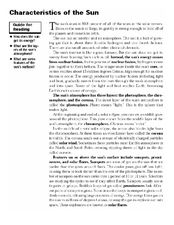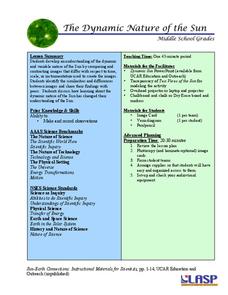Corona Teacher Resources
Find Corona lesson plans and worksheets
Showing 101 resources
SciShow
Why Is the Sun's Corona So Hot?
The sun isn't just a ball of fire! An informative video lesson discusses the makeup of the sun and the variation of temperature. The episode of a larger solar system playlist focuses on the corona and theories as to why it has the most...
Curated OER
Total Solar Eclipse, 1 August 2008
NASA telescopes have captured the beauty and mystery of a total solar eclipse. While this video does not have much in the way of dialogue or concept explanation, it does show a sight that some of us (kids included) may never witness. A...
Curated OER
The Universe - Secrets of The Sun 5/5
"Secrets of the Sun", the five-part series, concludes with description of the heat found on the surface of the sun. So how is it that the outer corona is as hot as the sun's core? The answer will surprise you. Watch and learn how noise...
Rice University
Characteristics of the Sun
After reading about how the sun gets its energy, and about the layers and features of the sun's atmosphere, heliologists complete a comprehension worksheet. On it, they label features on a diagram of the sun and match terms from the...
PBS
Eclipse Over America | The Coronal Heating ProblemData Plots of Exoplanet Orbital Properties
The sun's corona is hundreds of times hotter than the surface, but how? Scholars discuss the data and debate possible explanations for solar flares. Then, they view a video offering the current scientific theory behind this phenomenon.
PBS
Eclipse Over America | Coronal Mass Ejections from the Sun
The sun's corona, rarely seen from Earth, takes up massive amounts of space many times the size of our planet. Viewers discuss and view how scientists study the corona of the sun. They observe the impact of coronal mass ejections on...
Glynn County School System
Our Sun
The sun is responsible for almost 99 percent of the solar system's mass. As an essential part of our lives, the sun has many important features. A PowerPoint lesson presents information about features such as sunspots, the magnetic...
American Museum of Natural History
Create Your Own Time Capsule
The corona virus pandemic is indeed a historic event. A time capsule activity permits young historians to document these days of social distancing, remote learning, and quarantine by collecting artifacts that capture what their lives are...
Cengage Learning
COVID-19 and Coronaviruses
COVID-19 = CO (corona) + VI (virus) + D (disease) =19 (the year the disease first appeared) NOVEL (unknown to scientists and never before infected human patients). A colorful nine-slide presentation details what is currently known about...
Curated OER
The Hinode Satellite Views the Sun
In this sun's magnetic field lines worksheet, students use a photograph taken by the Hinode Satellite that shows the complex magnetic structure of the sun over a sunspot. Student predict the magnetic field lines and draw them on a...
Space Science Institute
The "All American" Eclipse Guide
Are you ready for the biggest astronomical event of the year? More importantly ... are you ready to share it with your scholars? Use a presentation filled with facts and diagrams to make sure everyone in class understands the importance...
Astronomical Society of the Pacific
Getting Ready for the All American Eclipse!
Give your pupils a front row seat at the biggest light show in the sky this year! In addition to admiring the total solar eclipse, young astronomers can explain the phenomenon with a little help from an inquiry-based instructional...
Mr. E. Science
Our Solar System
The presentation starts with the scientists who made discoveries about our solar system: Ptolemy, Copernicus, Galileo, Brahe, Kepler, and Newton. It also covers the planets, inner, outer, and Pluto, satellites, and an in-depth discussion...
Be Smart
The Science and Beauty of Auroras
Did you know that Earth is one of three planets that experiences auroras? A video explains what happens when the magnetic sun throws giant balls of plasma at the earth. It includes both the beauty and the damage an aurora can...
PHET
The Dynamic Nature of the Sun
For this second lesson of the series, pupils learn to observe similarities and differences in photos of the sun and record them in a Venn diagram. Then, small groups practice the same skill on unique images before presenting their...
PHET
Features of the Sun
There are so many things to discover about the sun! Pupils discuss their knowledge of the sun, explore its features, apply their knowledge by labeling photographs, and then reflect on their learning by working in groups to draw and label...
Laboratory for Atmospheric and Space Physics
Features of the Sun
An engaging tutorial teaches all about the sun. Learners see its different layers, explore the sun using different filters, and read about its different features. They then choose one feature to research and explore further.
Crash Course
The Sun
Our future literally depends on the sun. The video introduces the sun as a star. It explains the plasma magnetic fields, sunspots, solar flares, coronal mass ejections, and more. It concludes with how we rely on the sun, how we protect...
PBS
Total Solar Eclipse Animation
Don't leave your class in the dark about the solar eclipse! Show a short animation of what occurs during a total solar eclipse. The narrator describes each step in simple terms, allowing pupils to gain insight into the event.
SciShow
We're Heading to the Sun!
NASA currently operates missions to the sun at the center the galaxy as well as the mysterious glow at the outside edge of the solar system. Learn about both missions thanks to an engaging installment from the SciShow Space series....
Curated OER
The Sun
Students draw diagram of sun and its layers, including photosphere, chromosphere, corona, convection and radiative zones, and core. Students then describe each layer in their own words, define sun spot cycle, and describe solar flares.
Curated OER
Astronomy Unit Word List
For this astronomy worksheet, 8th graders are given 29 vocabulary words from their textbook unit and are to define the terms using their book and class notes.
C-SPAN
How A Bill Becomes A Law
Seven steps are required for a bill to become a United States law. The Families First Coronavirus Response Act (H.R. 6201) is used as a model for the process of how a bill becomes a law. Class members work independently through a...
Mathalicious
Pandemic
Young scientists use exponential growth and logarithms to model how a virus spreads through a population. Pupils watch a news clip about the 2012 outbreak of Ebola. Scholars then manipulate inactive graphs to see how various factors...
Other popular searches
- Coronary Heart Disease
- Coronal Mass Ejections
- Francisco Coronado
- Coronado
- Corona Effect on Conductor
- Coronary Artery
- Corona Typewriter
- Coronado's Expedition
- Castle Corona
- Coronal Flares
- Coronary Artery Blockage
- Coronary Artery Disease

























